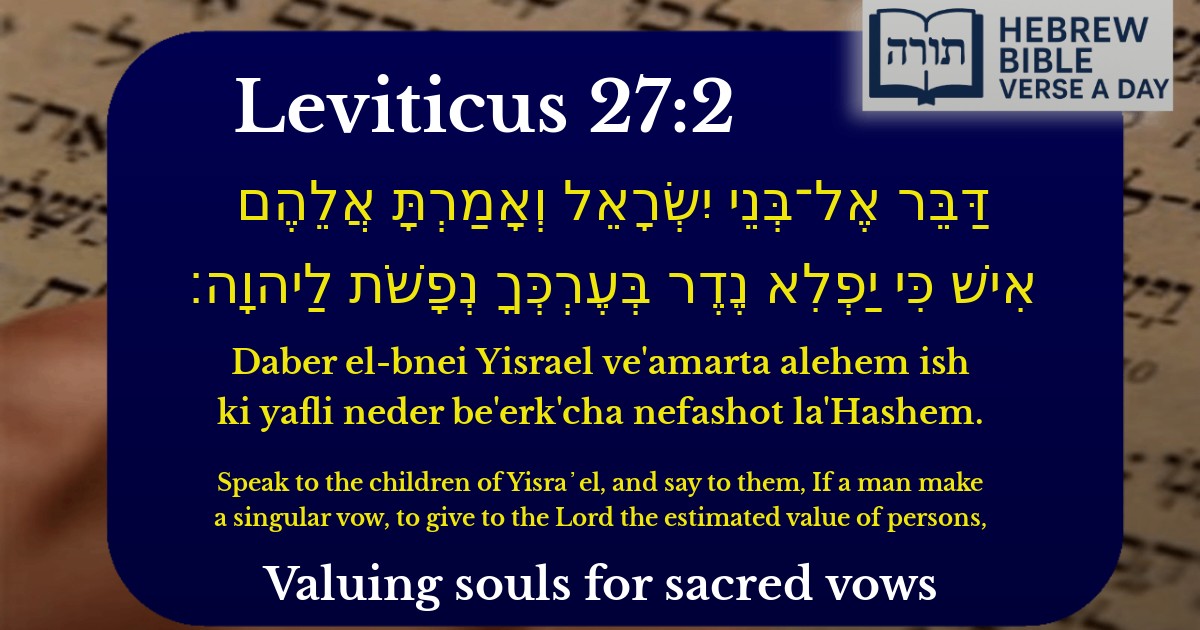Join Our Newsletter To Be Informed When New Videos Are Posted
Join the thousands of fellow Studends who rely on our videos to learn how to read the bible in Hebrew for free!
Hebrew Text
דַּבֵּר אֶל־בְּנֵי יִשְׂרָאֵל וְאָמַרְתָּ אֲלֵהֶם אִישׁ כִּי יַפְלִא נֶדֶר בְּעֶרְכְּךָ נְפָשֹׁת לַיהוָה׃
English Translation
Speak to the children of Yisra᾽el, and say to them, If a man make a singular vow, to give to the Lord the estimated value of persons,
Transliteration
Daber el-bnei Yisrael ve'amarta alehem ish ki yafli neder be'erk'cha nefashot la'Hashem.
Hebrew Leining Text
דַּבֵּ֞ר אֶל־בְּנֵ֤י יִשְׂרָאֵל֙ וְאָמַרְתָּ֣ אֲלֵהֶ֔ם אִ֕ישׁ כִּ֥י יַפְלִ֖א נֶ֑דֶר בְּעֶרְכְּךָ֥ נְפָשֹׁ֖ת לַֽיהֹוָֽה׃
דַּבֵּ֞ר אֶל־בְּנֵ֤י יִשְׂרָאֵל֙ וְאָמַרְתָּ֣ אֲלֵהֶ֔ם אִ֕ישׁ כִּ֥י יַפְלִ֖א נֶ֑דֶר בְּעֶרְכְּךָ֥ נְפָשֹׁ֖ת לַֽיהֹוָֽה׃
🎵 Listen to leining
Parasha Commentary
📚 Talmud Citations
This verse is quoted in the Talmud.
📖 Arakhin 2a
The verse is discussed in the context of the laws concerning vows and the valuation of persons dedicated to the Temple.
📖 Nedarim 10b
The verse is referenced in the discussion about the nature and validity of vows made to the Lord.


Overview of the Verse
The verse (Vayikra 27:2) introduces the laws of nedarim (vows) and arakhin (valuations), where a person pledges the value of a human being to the Beit HaMikdash. This falls under the broader category of hekdesh (consecrated property). The Torah outlines a fixed valuation system based on age and gender, as detailed in the subsequent verses.
Rashi's Commentary
Rashi explains that the term "כי יפליא נדר" ("if a man makes a singular vow") refers to a unique type of vow where one pledges the monetary value of a person rather than the person themselves. This is distinct from dedicating a person directly to the Temple service (which is not permitted). Rashi emphasizes that the valuation is based on the fixed amounts prescribed by the Torah, not subjective worth.
Rambam's Explanation (Hilchot Arachin)
Rambam (Maimonides) in Hilchot Arachin (1:1) clarifies that this mitzvah applies only when the Beit HaMikdash is standing, as the valuations are given to the Temple treasury. He further notes that the pledge must be made explicitly—using terms like "ערכי עלי" ("my valuation is upon me")—to take effect.
Talmudic Discussion (Arachin 19a)
The Talmud explores whether the valuation applies to a person who is deceased or not yet born. The conclusion is that only living individuals can be subject to arakhin, as the verse specifies "נפשֹת" ("persons"), implying those with current life status.
Midrashic Insight (Vayikra Rabbah 37:2)
The Midrash connects this mitzvah to the sanctity of human life, teaching that one who pledges an erekh (valuation) acknowledges that all souls belong to Hashem. By assigning a fixed value, the Torah ensures fairness and prevents arbitrary assessments of human worth.
Key Halachic Principles